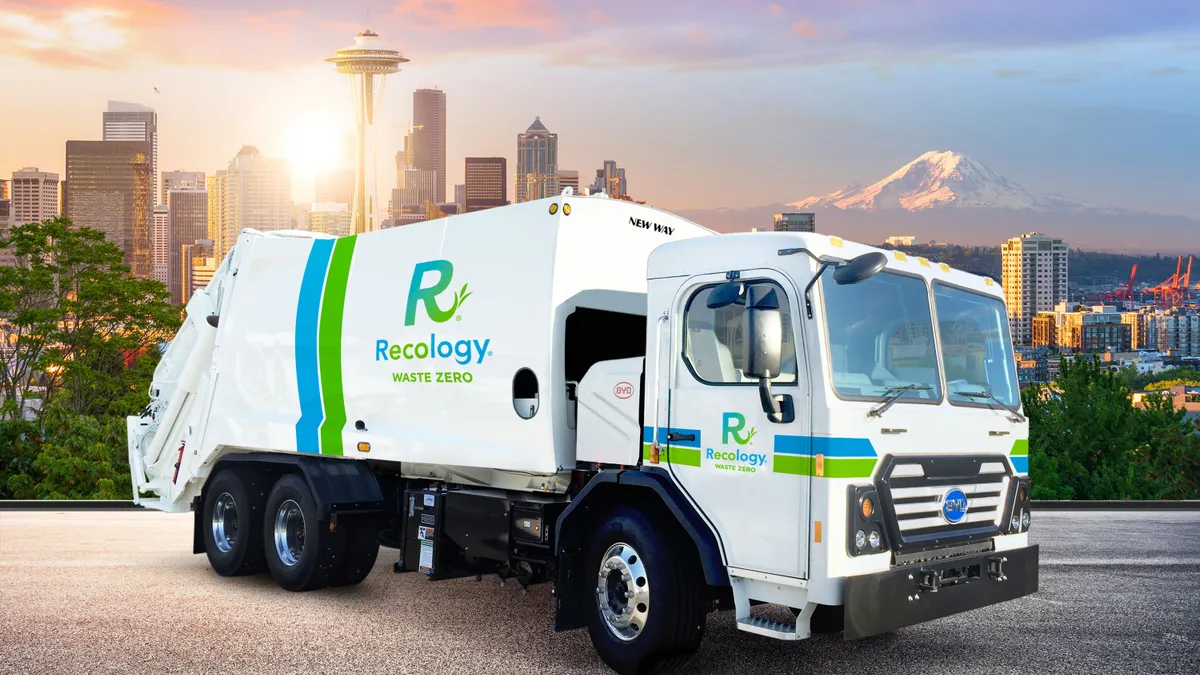Highlights
Contract terms:
New 10-year deals, starting in April 2019, mandating 2018 or later vehicle models running on 100% renewable fuel.
Fleet plans:
Waste Management is using renewable natural gas and Recology is using renewable diesel. Both will also pilot electric vehicles, including two Class 8 heavy duty electric route trucks, four Class 6 midsize electric trucks for small routes and container delivery, and 10 electric supervisor pick-up trucks and support vehicles.
Outlook:
Seattle will continue to look for more ways to reduce its fleet emissions and other cities around the U.S. can be expected to pursue increasingly ambitious fuel requirements in future contracts.
Earlier this year, Seattle approved two commercial waste contracts, worth a collective $850 million, that promise to bring new savings, service capabilities and educational initiatives. For a city that's already well on its way to ambitious recycling targets, there were few environmental frontiers left to explore — except for fleet specifications.
“It’s not like we’re rolling out food waste or anything. All those services are in place," said Hans Van Dusen, solid waste contracts manager for Seattle Public Utilities. “When you change over a contract every 10 years, and the way technology evolves, fleet is always a great opportunity."
The Drive Clean Seattle initiative, part of the city's goal to achieve carbon neutrality by 2050, has already made electrification a priority for other government fleets and personal vehicles. Bringing it to the waste and recycling sector was a first. Waste Management has kept an eye on electric vehicles, but hasn't moved on any collection pilots yet.
Recology had already been eyeing ways to test them out locally in the coming years. While the company has experience with hybrids and electric powertrains — including the Wrightspeed technology it inherited through a 2017 acquisition — this marks a new step. So when language specifically encouraging a proposal appeared in the RFP, the company saw a clear opportunity. Derek Ruckman, vice president and group manager for Recology's Pacific Northwest division, called the RFP's structure one of the "most progressive" for a variety of reasons and encouraged other cities to consider similar experiments.
“Partner with your customers and think outside of the box. In this case we were able to share risk, we were able to push the envelope," Ruckman said. "When you have good partnerships, you have open dialogue, you can actually move the needle on some of the innovation in this industry."
Recology will be starting out with just two electrified collection vehicles (in a fleet of about 90) and keeping them on shorter routes downtown close to its garage. One will come in 2019, the other in 2020. In recognition of the potential risk involved, SPU agreed to reimburse the company $200,000 per truck within three months of permanent deployment.
BYD, the company supplying these two vehicles, recognizes the hesitation but has an ample track record: by March 2019, it will have 6,000 electric trucks of various types — including refuse collection — operating in China. BYD currently has dozens of vehicles operating in Pacific Coast states, including Class 6 and Class 8 models for customers to test out.
“The U.S. right now is playing catch up. We’re a little bit behind in terms of electric vehicle technology deployment, and we have a long way to go, but I’m confident that in the next 5-10 years the majority of heavy trucks on the road will be electric," said John Gerra, director of business development for BYD's Western U.S. region. “The trucks are real, they are reliable, and we can deploy and build them today."
With some of the largest private and municipal fleets currently focusing far more attention on forms of renewable natural gas, this would mark a major shift. Commonly cited barriers are operating range, maintenance needs and cost. But the vehicles also don't require the same type of fueling infrastructure as natural gas, which some cities have described as a barrier.
Gerra said SPU's approach is a smart one and something multiple other cities are currently considering. In addition to local subsidies, some West Coast states have programs of their own, and funding is also available from the Volkswagen emissions scandal mitigation fund.
“It is a desired incentive to have cities pitch in to help build the scale that’s necessary to drive down the manufacturing costs for this new technology. We’re not at the scale that the traditional diesel manufacturers are at," Gerra said. “So in order to help this new technology grow and become more affordable for end users, incentives play an important role."
Van Dusen said he also believes municipalities can play a key role in procurement policy, and should never settle for the latest technology when such rapid environmental progress is needed to combat climate change.
“We’re pleased that all the fuel we’re purchasing now is renewable — renewable diesel and renewable natural gas. So that’s good, but it’s not unlimited," he said. “We know that if we can reduce carbon consumption through electrification it allows those renewable carbon sources to be used further for other applications."
Read More
-
Recology to take delivery of two new electric rear loader trucks
By Jordan Schultz • July 20, 2018
























